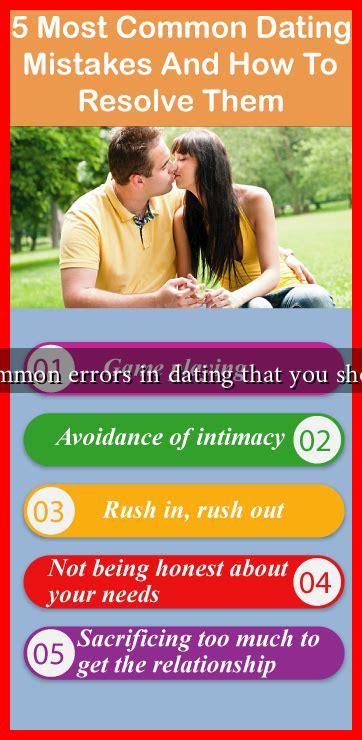-
Table of Contents
What Are the Common Errors in Dating That You Should Be Aware Of
Dating can be a thrilling yet daunting experience. While many people enter the dating scene with high hopes, they often encounter pitfalls that can derail their romantic pursuits. Understanding these common errors can help you navigate the dating landscape more effectively. In this article, we will explore the most prevalent mistakes people make while dating and provide insights on how to avoid them.
1. Unrealistic Expectations
One of the most significant errors in dating is having unrealistic expectations. Many individuals enter relationships with a checklist of qualities they desire in a partner, often overlooking the importance of compatibility and emotional connection.
- Perfectionism: Expecting your partner to be flawless can lead to disappointment. No one is perfect, and focusing on minor flaws can blind you to the positive attributes of your partner.
- Idealization: Putting someone on a pedestal can create an unhealthy dynamic. It’s essential to see your partner as a whole person rather than an idealized version of them.
According to a study published in the Journal of Social and Personal Relationships, unrealistic expectations can lead to dissatisfaction and increased relationship conflict. It’s crucial to approach dating with an open mind and a willingness to embrace imperfections.
2. Poor Communication
Effective communication is the cornerstone of any successful relationship. However, many people struggle with expressing their feelings and needs, leading to misunderstandings and resentment.
- Assuming Mind Reading: Expecting your partner to know what you’re thinking or feeling without expressing it can create frustration. Always communicate your thoughts and feelings clearly.
- Avoiding Difficult Conversations: Many individuals shy away from discussing sensitive topics, fearing conflict. However, addressing issues head-on can strengthen your relationship.
A survey by the American Psychological Association found that couples who engage in open communication are more likely to have satisfying relationships. Make it a habit to check in with your partner regularly to foster a healthy dialogue.
3. Rushing the Relationship
In the excitement of new love, many people rush into relationships without taking the time to truly get to know their partner. This can lead to premature commitments and heartbreak.
- Moving Too Fast: Jumping into a serious relationship too quickly can create pressure and anxiety. Take the time to build a solid foundation based on trust and understanding.
- Ignoring Red Flags: When infatuated, it’s easy to overlook warning signs. Pay attention to behaviors that may indicate incompatibility or unhealthy patterns.
Research from the University of California suggests that couples who take their time to develop their relationship are more likely to experience long-term success. Patience is key in building a meaningful connection.
4. Neglecting Self-Care
In the pursuit of love, many individuals forget to prioritize their own well-being. Neglecting self-care can lead to burnout and dissatisfaction in relationships.
- Loss of Identity: Merging your life with someone else’s can sometimes lead to losing sight of your own interests and passions. Maintain your individuality to foster a healthy relationship.
- Emotional Dependency: Relying too heavily on your partner for happiness can create an unhealthy dynamic. Cultivate your own hobbies and friendships outside of the relationship.
A study published in the Journal of Happiness Studies found that individuals who prioritize self-care are more likely to have fulfilling relationships. Remember, a healthy relationship starts with a healthy you.
Conclusion
Dating can be a complex journey filled with ups and downs. By being aware of common errors such as unrealistic expectations, poor communication, rushing the relationship, and neglecting self-care, you can enhance your dating experience. Remember to approach dating with an open heart and mind, communicate effectively, take your time, and prioritize your well-being. By doing so, you’ll be better equipped to build meaningful and lasting connections.
For more insights on dating and relationships, consider visiting Psychology Today.

